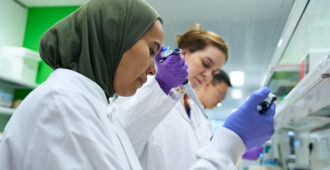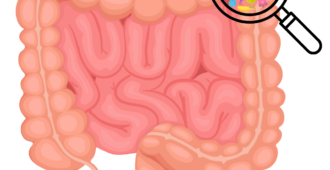Published in the prestigious journal Nature Communications and funded by the Wellcome Trust, University of Bath researchers looked closely at the structure of 11 mutated angiogenin proteins, and how changes in their structure influenced activity, function and survival in motor neurones.
Dr Brian Dickie, Director of Research at the Association, said “The researchers at the University of Bath have skilfully combined aspects of biology, chemistry and physics to answer some fundamental questions on how angiogenin can damage motor neurones. It not only advances our understanding of the disease, but may also give rise to new ideas on treatment development.”
Mutated forms of the gene editing protein, angiogenin, are known to cause MND in some families affected by the inherited form of the disease. This is due to a mutation in the normal angiogenin gene (a mistake in the instructions for making the protein) that leads to the production of a faulty/mutated angiogenin protein.
This new research expands on our knowledge of angiogenin, as back in June this year angiogenin, was identified by Irish researchers as playing a vital role in motor neurones with the effects tested in a mouse model of MND.
Creating images with x-rays
University of Bath researchers used a technique known as x-ray crystallography (a method that uses x-ray light to produce highly detailed images of the structure of a protein). Using this technique they were able to view the structure of angiogenin, and 11 angiogenin MND mutants, in exquisite detail. Specifically the researchers looked at the active site (where all the action happens) for changes that may affect the function and activity of the mutated proteins.
These x-ray crystallography images show stunning structural differences in the angiogenin MND mutant proteins, particularly around the active site, and the researchers found that these structural changes caused the mutated angiogenin proteins to have varying levels of activity.
Dr Vasanta Subramanian, who was involved in the research, said: “We hope that the scientific community can use this knowledge to help design more drugs that will bind selectively to the defective protein to protect the body from its damaging effects.”
An MND Association funded study has also used this technique of x-ray crystallography to look at the structure of mutant SOD1 proteins, which are another cause of inherited MND. Under the leadership of Prof Samar Hasnain, Dr Neil Kershaw is also one step ahead and is examining potential drugs to ‘mend’ these abnormal SOD1 proteins. This shows how this type of research, investigating structure and activity of the mutated proteins, can influence the development of new drugs.
What happens to angiogenin in the cell?
As well as changes in the activity of the protein the structural changes cause the angiogenin MND mutants to lose their function, leaving a protein sitting around in the cell, unable to do anything! The researchers found that it is essential that angiogenin is transported from the cytoplasm to the nucleus of the cell in order for the protein to function properly. This is an important step during the process in which proteins are made, if this does not occur then the protein will not function properly. In the angiogenin MND mutant proteins this does not occur correctly with either none, or very little, angiogenin being transported to the cell nucleus. This means that the angiogenin MND mutant proteins do not function properly compared to the normal angiogenin protein.
Stress Granules
The University of Bath researchers also found that the angiogenin MND mutant proteins prevented the motor neurones from producing ‘stress granules’. These are little packages that appear when a neurone is under stress, such as when low oxygen levels occur. When this stress factor occurs they release their contents to protect the motor neurone from damage.
These stress granules are the motor neurones natural defence mechanism. Without these granules the cell’s natural defences are lost and this influences the survival of the cell.
In Summary
This research gives us an important insight into how MND mutations affect the normal structure and function of angiogenin in motor neurones in some inherited forms of the disease. This not only advances our understanding of the disease, but may give rise to new ideas on treatment development in the future.






Comments are closed.